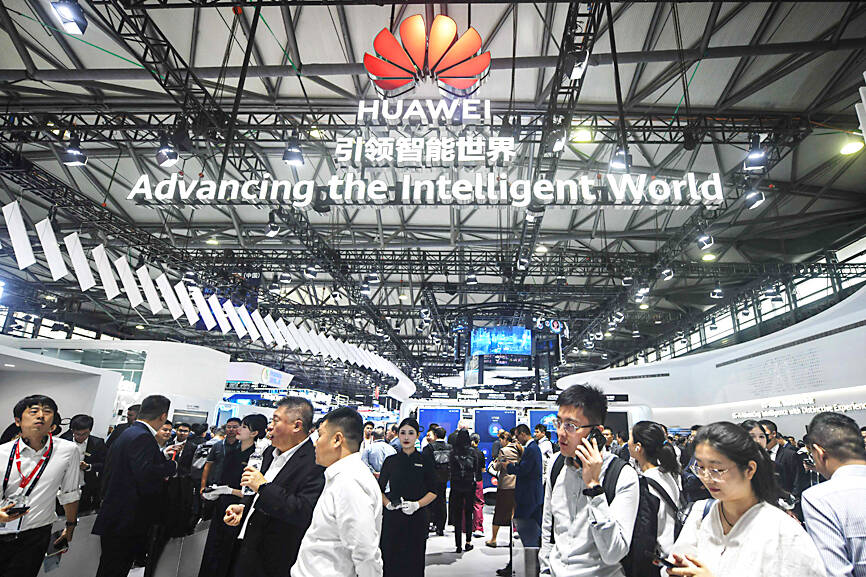China’s Huawei Technologies Co (華為) plans to start mass-producing its most advanced artificial intelligence (AI) chip in the first quarter of next year, even as it struggles to make enough chips due to US restrictions, two people familiar with the matter said.
The telecoms conglomerate has sent samples of the Ascend 910C — its newest chip, meant to rival those made by US chipmaker Nvidia Corp — to some technology firms and started taking orders, the sources told Reuters.
The 910C is being made by top Chinese contract chipmaker Semiconductor Manufacturing International Corp (SMIC, 中芯) on its N+2 process, but a lack of advanced lithography equipment has limited the chip’s yield to about 20 percent, said one source who was briefed on the results.

Photo by AFP
Advanced chips need yields of more than 70 percent to be commercially viable.
Even Huawei’s current most advanced processor, the SMIC-produced 910B, has a yield of only about 50 percent, forcing Huawei to slash production targets and delay filling orders for that chip, the sources said.
Huawei and SMIC did not respond to requests for comment on Thursday.
TikTok’s Chinese parent, ByteDance Ltd (字節跳動), ordered more than 100,000 Ascend 910B chips this year, but had received fewer than 30,000 as of July, a pace too slow meet the company’s needs, Reuters reported in September.
Other Chinese technology companies that have ordered from Huawei have complained of similar problems, sources have said.
US curbs include barring China since 2020 from obtaining extreme ultraviolet lithography (EUV) technology from Dutch manufacturer ASML Holding NV, used to make the world’s most sophisticated processors.
“Huawei knows there is no short-term solution, given the lack of EUVs, so it will give priority to strategic government and corporate orders,” the sources said.
ASML has also stopped shipping its most advanced deep ultraviolet lithography (DUV) machines to China due to rules imposed by US President Joe Biden’s administration last year. Some fabs have also been restricted from buying older ASML DUV models.
SMIC demands a premium of up to 50 percent for chips made on its advanced nodes, which are less advanced than those of Taiwan Semiconductor Manufacturing Co (TSMC, 台積電) and are made using enhanced ASML DUVs. Huawei has supplemented its SMIC-produced chips with ones manufactured by rival TSMC, according to analysts and sources.
TSMC notified the US Department of Commerce several weeks ago that one of its chips had been found in a Huawei 910B processor. The US has placed Huawei on a trade list that requires suppliers to obtain licenses to ship any goods or technology to the company.
Washington has since clamped down further, ordering TSMC to halt shipments of advanced AI chips to Chinese customers, in a move targeting the diversion of chips to Huawei.
US authorities are planning export controls on the semiconductor industry that would further restrict shipments for Chinese firms.
Donald Trump, who was US president from 2017 to 2021 and is to return to the White House in January, has made tough-on-China trade policies core to his economic agenda.

LIMITED IMPACT: Investor confidence was likely sustained by its relatively small exposure to the Chinese market, as only less advanced chips are made in Nanjing Taiwan Semiconductor Manufacturing Co (TSMC, 台積電) saw its stock price close steady yesterday in a sign that the loss of the validated end user (VEU) status for its Nanjing, China, fab should have a mild impact on the world’s biggest contract chipmaker financially and technologically. Media reports about the waiver loss sent TSMC down 1.29 percent during the early trading session yesterday, but the stock soon regained strength and ended at NT$1,160, unchanged from Tuesday. Investors’ confidence in TSMC was likely built on its relatively small exposure to the Chinese market, as Chinese customers contributed about 9 percent to TSMC’s revenue last

With this year’s Semicon Taiwan trade show set to kick off on Wednesday, market attention has turned to the mass production of advanced packaging technologies and capacity expansion in Taiwan and the US. With traditional scaling reaching physical limits, heterogeneous integration and packaging technologies have emerged as key solutions. Surging demand for artificial intelligence (AI), high-performance computing (HPC) and high-bandwidth memory (HBM) chips has put technologies such as chip-on-wafer-on-substrate (CoWoS), integrated fan-out (InFO), system on integrated chips (SoIC), 3D IC and fan-out panel-level packaging (FOPLP) at the center of semiconductor innovation, making them a major focus at this year’s trade show, according

DEBUT: The trade show is to feature 17 national pavilions, a new high for the event, including from Canada, Costa Rica, Lithuania, Sweden and Vietnam for the first time The Semicon Taiwan trade show, which opens on Wednesday, is expected to see a new high in the number of exhibitors and visitors from around the world, said its organizer, SEMI, which has described the annual event as the “Olympics of the semiconductor industry.” SEMI, which represents companies in the electronics manufacturing and design supply chain, and touts the annual exhibition as the most influential semiconductor trade show in the world, said more than 1,200 enterprises from 56 countries are to showcase their innovations across more than 4,100 booths, and that the event could attract 100,000 visitors. This year’s event features 17

Hon Hai Precision Industry Co (鴻海精密), which assembles servers for Nvidia Corp, yesterday said that revenue last month rose 10.61 percent year-on-year, driven by strong growth in cloud and networking products amid continued front-loading orders for artificial intelligence (AI) server racks. Consolidated revenue expanded to NT$606.51 billion (US$19.81 billion) last month from NT$548.31 billion a year earlier, marking the highest ever in August, the company said in a statement. On a monthly basis, revenue was down 1.2 percent from NT$613.86 billion. Hon Hai, which is also a major iPhone assembler, added that its electronic components division saw significant revenue growth last month, boosted